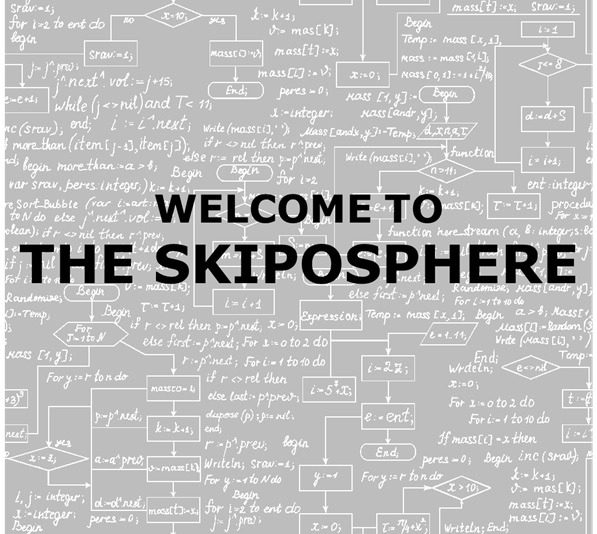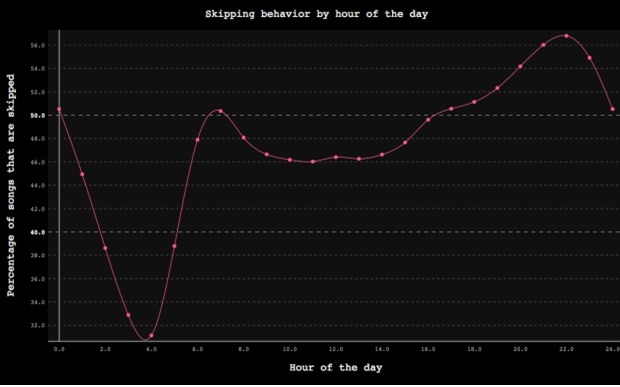
Last May, Bill Jacobs wrote a guest blog – “Turn On, Tune In, Drop Out” – based on a study by Paul Lamere that appeared in his blog, “Music Machinery.” The post – “The Skip” – was a fascinating study about how Spotify users use the skip function to customize their music listening experience.
And it got more granular from there. The frequency and speed at which consumers skip (it’s often very fast), who skips the most (women slightly, and teens), when skipping occurs the most (mornings and after dark), and on which devices (mobile phones, naturally) skipping is done most often.
In his post, Bill compared this skipping data on Spotify with the ways people change radio stations when they hear a song they find unappealing. And that’s a natural comparison because Lamere’s study is all about the changing ways in which people listen to music.
So six months later, I ran across the same article on Twitter (courtesy of KUFX’s Big Rick Stuart), and after re-reading it, I couldn’t help but wonder if there isn’t something much bigger going on here than just music skipping. Because when you read “The Skip,” it’s hard not to reach the conclusion that this phenomenon is more about how our brains are being re-trained by the new media and modern technology that have permeated our lives.
Yes, the ability to skip impacts the way we choose and consume music, but it also affects just about everything else we do – from TV and video viewing to email selection and reading to even conversation. At a conference in 2013, Google chairman Eric Schmidt suggested that with the proliferation of smartphones, we’re never bored – that there’s always something for us to listen to, watch, and do. For a consumer, this is a field day. For content creators, it’s a nightmare.
We have entered “The Skiposphere” and it is changing the way consumers use media. And it should be altering the way we think about how we program and present content on our radio stations and our other platforms.
This Spotify data signify great behavioral changes – not just in the way people listen to music – but in the way they select, use, and process all media. It points to a declining lack of patience and tolerance for anything and everything that bores us – or even threatens to.
Welcome to “The Skiposphere.”
When we go to a movie theater (or even back in the Blockbuster days), there is an implied commitment to watch the film – or at least most of it. Today with on-demand movies, we can watch a film for 30 seconds, and then decide to exit and try something else if we’re not drawn in from the beginning.
When someone sends us a video, it’s typical to take note of its length before pushing play. In fact, its duration often trumps its title or subject. We make snap value judgments using that little indicator in the bottom right corner that shows us how much time a video will extract from our lives. After all, how much of a commitment do we really want to make to this video right now? And unlike the way we might flit around with a written article or blog post, it’s difficult to skim a video.
And when it comes to music, it’s the same thing. Car radio push buttons were upgraded by iPod skips and eventually, the ability to bypass songs at will on platforms like Pandora and Spotify.
We may not even know why we skip so often and so quickly. Our responses are often visceral, emotional, mood-driven, and in the moment. Skipping plays a major role in the way we consume pure-plays. The inability to skip more songs is the top reason why some people dislike Pandora.
Technology hasn’t just changed the way we consume media – it’s changed us.
We all subconsciously enter “The Skiposphere” as we use the technology, and over time, we find that it alters us permanently (sort of like a techie version of “Hotel California”).
Some say that PPM has created a chilling effect for programmers, hosts, and shows. But in many ways, metered, real-time listening is in-synch with “The Skiposphere.” While a typical reaction to the PPM methodology may be to play it safe, the new rules of “The Skiposphere” would suggest being as bold and compelling as possible right at the outset of a segment, feature, or bit. And not wasting a lot of time getting to that brilliant content.
Lamere’s data shows there’s a song skipping peak during the heart of what we call “morning drive.” (He did his study in the UK so let’s call it “breakfast.”) It’s one of the times where that skipping finger is especially likely to jump into action at the first sign of an undesirable song.
Why wouldn’t we extrapolate from this Spotify data that the same impulses are in play when consumers are listening to a morning show, commercials, or anything else especially where they’re in a position to alter their media surroundings with a single “skip” or button punch while they are likely commuting to work?
“The Skiposphere” suggests that a rethink is necessary in the world of programming – that simply creating “rules” in scheduling software is a surface mechanical action that has less to do with the ways that people listen to the radio. It is not about what goes where, but more about what the “what” is and how quickly it appears and connects with the consciousness of the consumer, and its ability to sustain her attention. That has less to do with a B1 following an R and more to do with the “connective tissue” that only radio can offer that bridges content and keeps the consumer engaged.
“The Skiposphere” demands a different way of looking at the content puzzle. From the inside, it may seem to most PDs that nothing has really changed. But in fact, consumer brains have been rewired, creating a different set of demands, desires, and reactions to the content they program.
Radio’s challenge isn’t just about the expanded competitive landscape. It is also centered on a changing consumer mindset and behavioral grid. The new rules demand we rethink how we move from point A to point B, whether we’re programming a music station, a talk show, or even a public radio news magazine. How can we use innovative methods to keep the consumer interested and engaged in an A.D.D. world?
Welcome to “The Skiposphere.”
- What To Do If Your Radio Station Goes Through A Midlife Crisis - April 25, 2025
- A 2020 Lesson?It Could All Be Gone In A Flash - April 24, 2025
- How AI Can Give Radio Personalities More…PERSONALITY - April 23, 2025





This is great and interesting information Fred. Having spent a long time in the sports talk word, I believe the same principals are applicable. in sports radio our topics are our records. You have to have the content that is relevant to the audience. If a talent will waste time and not get to the good stuff,the listener will skip to somewhere else. So it is all about compelling opinions, storytelling and not wasting time. The audience has no patience for stuff that doesn’t matter..and in a world where just one or two meters can make a difference, it is so important that the talent understand why they need to get to the good stuff as soon as possible!
Scott, thanks for the spot on comments. Much if what you teach to your sports host is so applicable to talent everywhere. And it couldn’t be more timely given the changing nature of consumption.